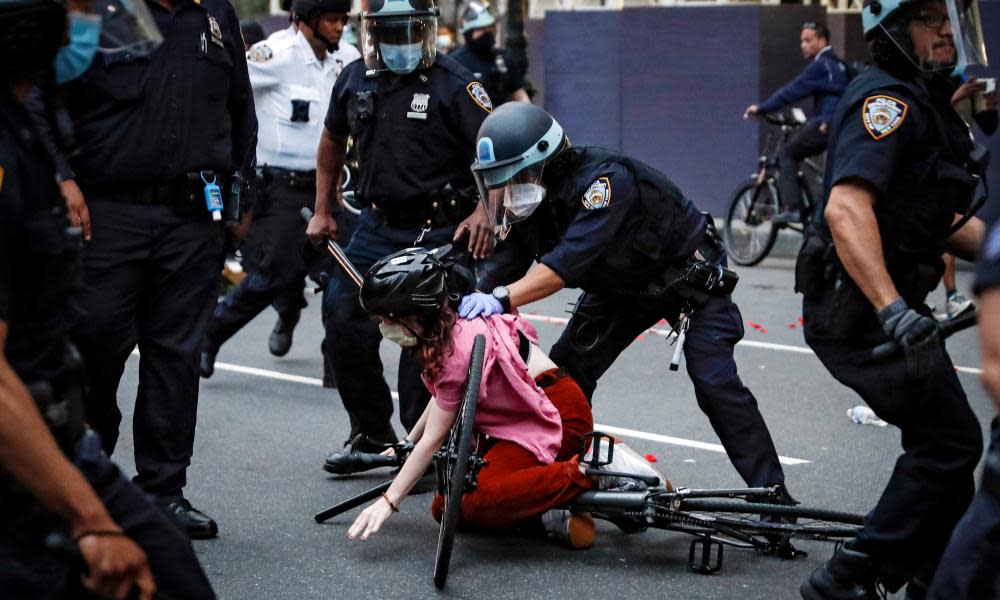New York to pay $13.7m to George Floyd protesters arrested or beaten by police

- Oops!Something went wrong.Please try again later.
New York City has agreed to pay more than $13m to thousands of people who say they were arrested or beaten by NYPD officers during racial justice protests in 2020.
On Wednesday, the city accepted a sum of $13.7m to settle a class-action lawsuit. The settlement, which must be approved by a judge, would be among the most expensive payouts ever awarded in a suit over mass arrests.
The civil rights lawsuit focuses on 18 different protests that took place during racial justice demonstrations in 2020, after the murder of George Floyd by police in Minneapolis sparked nationwide and international protests over police misconduct and systemic racism.
Related: ‘A budget is a moral document’: why does the NYPD need $29m a day?
Attorneys with the National Lawyers Guild, which represented the plaintiffs in New York, accused NYPD leaders of depriving protesters of their first amendment rights through a “coordinated” campaign of indiscriminate brutality and unlawful arrests.
Adama Sow, one of the named plaintiffs in the lawsuit, said their group of marchers were trapped by police without warning. Sow and the other arrestees were placed in zip ties until their hands turned purple, they said, then held in a sweltering city government bus for several hours.
“It was so disorganized, but so intentional,” Sow said. “They seemed set on traumatizing everyone.”
With certain exceptions, people arrested or subjected to force by NYPD officers at those protests will each be eligible for $9,950 in compensation, according to attorneys for the plaintiffs.
The agreement, one of many stemming from the 2020 Black Lives Matter protests, allows the city to avoid an expensive and politically fraught trial.
In March, New York City has already agreed to pay $6m to other protesters who were arrested, detained and subjected to excessive force during a protest for George Floyd in the Bronx.
According to a lawsuit filed against the NYPD in that case, 320 protesters were subject to “kettling”, a controversial police tactic in which officers encircle and press in upon groups of protesters.
Protesters were then zip-tied, hit with batons, and pepper-sprayed. Each individual in that case will receive about $21,000 from the settlement. An additional $2,500 will be paid out to protesters who were served a desk appearance ticket, NBC News reported.
Separately, more than 600 people have brought individual claims against New York City related to police action during the 2020 protests, according to the city’s comptroller, Brad Lander. Roughly half of them have resulted in settlements and resolutions, costing the city nearly $12m to date.
The latest settlement comes as many other US cities are negotiating their own deals with protesters who say they were injured while advocating for racial justice.
As of May, at least 19 cities had decided to pay out more than $80m total to those who sustained injuries from police, such as being teargassed or shot at close range with projectiles. Many more cases are ongoing.
The number of settlements stemming from police misconduct during 2020 protests is unprecedented, experts say.
“I have never seen a wave of settlements for police brutality like this in American history,” Justin Hansford, a professor at Howard University School of Law, and executive director of the Thurgood Marshall Civil Rights Center, told the Guardian in May.
Wylie Stecklow, an attorney and part of the legal team who represented the protesters in the latest class-action lawsuit in New York, told the Guardian that the settlement represented “justice” for protesters.
“This brings a lot of justice to almost 1,400 people who went out into the streets and put their bodies on the line to bring awareness to police brutality,” Stecklow said.
Many protesters are still dealing with the physical and mental consequences of police misconduct during 2020 protests, Stecklow said.
“There are people who are afraid to go out to protests,” Stecklow said. “There are people whose wrists were in flex-cuffs for so long and so tight that they still have numbing and bad feelings in their wrists and their thumbs and their fingers.”
Stecklow said the settlement should serve as “red flag” to city leaders on police conduct.
“They would have to examine why it is that the police can act in such a way that creates lawsuits that result in multibillion-dollar settlements,” Stecklow said.
The Associated Press contributed reporting

